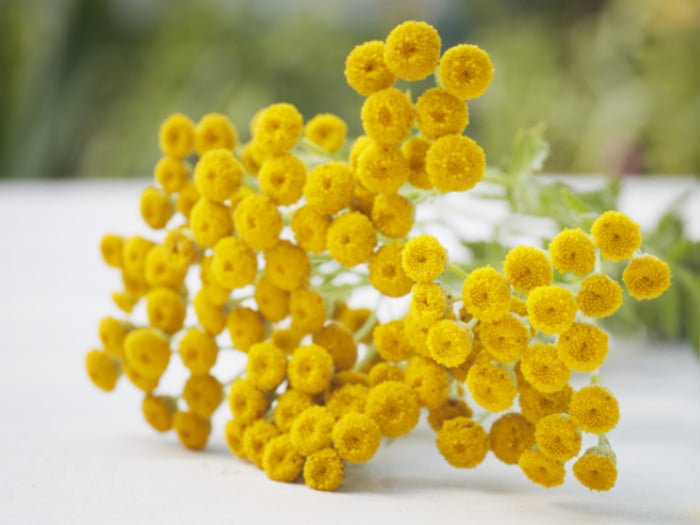Tansy may be considered little more than a roadside weed by some, but it has been a staple of traditional folk medicines for centuries.
What is Tansy?
Common throughout Europe and Asia, the tansy is a thin, weedy plant with small, yellow, button-like flowers. It was an extremely popular medicinal herb in the Middle Ages, and a culinary spice, despite the fact that the plant’s parts are actually very bitter. Tansy is toxic in large doses, due to the chemical thujone, and should only be taken carefully. Even just touching the leaves can result in contact dermatitis. [1]

Tansy offers several health benefits. Photo Credit: Shutterstock
Benefits
There are many benefits of tansy, including the following:
- Tansy tea is often prescribed for joint pain or to alleviate fluid retention.
- It helps eliminate intestinal worms. Historically, a tea brewed from these dried flowers or leaves has also been used as a parasitic to treat intestinal worms, and for killing roundworm or threadworm in children.
- As an emmenagogue, tansy tea is often drunk by women starting menstrual flow, to encourage regular menstruation.
- The flowers are considered a gastrointestinal stimulant, improving digestion and appetite.
- It is also used for a variety of digestion issues, including gas, stomach spasms, ulcers, and bloating.
- It is also thought to be beneficial for kidney problems.
- When applied topically, this herb may be of use for scabies, or for killing bacteria and lice.
- The active ingredients are an anticonvulsant in nature and are used for preventing seizures. [2]
- This herb may be calming to nerves and is prescribed for treating migraines.
Uses
Tansy has fallen out of favor as a cooking spice because of its bitterness.
- Most people prefer to drink tea prepared with the herb, but the flowers and leaves are also edible. [3]
- It can also be applied topically as a pain reliever and insecticide, in both oil and poultice form, though topical application increases the risk of toxicity and allergic reactions.
Side Effects
This herb is toxic both externally and internally, and should only be taken under the supervision of a medical professional to avoid overdosing.
- Pregnancy & breastfeeding: Women should avoid this herb throughout pregnancy or while breastfeeding, as tansy may induce bleeding or miscarriage.
- Allergic reactions: If you are allergic to ragweed, you may have a cross-reaction, and tansy should also be avoided by anyone diagnosed with the metabolic disease porphyria.
Generally speaking, whenever you introduce a new herbal medication to your health regimen, it is best to speak first with your doctor.
